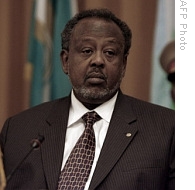VOA标准英语2008年-East African Leaders Join Condemnation of Eritr
搜索关注在线英语听力室公众号:tingroom,领取免费英语资料大礼包。
(单词翻译)
By Peter Heinlein
Addis Ababa
14 June 2008
Eritrea has dominated discussions at an East African summit in Addis Ababa attended by all regional leaders except Eritrean President Isaias Afwerki. From the summit site, VOA's Peter Heinlein reports the leaders present issued a joint1 communiqué condemning2 Eritrea's military attack on its neighbor, Djibouti.
 |
| Djibouti's President Ismael Omar Guelleh attends the IGAD summit in Addis Ababa, 14 June 2008 |
MARGIN7-TOP: 0px; MARGIN-BOTTOM: 0px">When leaders of six out of seven member states of the East African development agency (IGAD) met Saturday, it was the missing member that got most of the attention.
Eritrea suspended its membership in the regional grouping last year after other members refused to criticize its archrival Ethiopia for sending troops to Somalia.
At a summit that lasted only three hours Saturday, the other IGAD members condemned3 what was described a "military attack by Eritrean troops" along the border with its tiny neighbor Djibouti. The U.N. Security Council condemned the attacks earlier in the week.
In his speech to the summit, Kenya's President Mwai Kibaki, the outgoing IGAD chief, called the border clashes a matter of grave regional concern.
"The use of force in solving disputes is both unworkable and unsustainable," he said. "I therefore wish to ask the sister states of Djibouti and Eritrea to exercise restraint and to resolve the dispute amicably4 through dialogue."
Djibouti's President Ismael Omar Guelleh briefed a closed-door summit session on the border clashes.
Speaking separately to VOA, President Guelleh said he does not understand why the fighting started.
"It's an Eritrean aggression5. Why? I don't know," he said. "We always had good relations with this regime, but suddenly they occupied one part of our country and started aggression and denying it till now with all the casualties we are suffering."
Djibouti's Foreign Minister Mohammed Ali Yusuf said his country's 4,000-strong army had lost 12 soldiers in three days of clashes. He told VOA that Eritrean forces apparently6 are crossing the border and setting up positions to catch army deserters fleeing to Djibouti. He says efforts to establish a dialogue with Eritrean government officials have been rebuffed.
"We have tried to get in touch with them, but they refuse all kind of diplomatic process, good offices," he explained. "They just turn down all offers. And we are trying to understand, but they don't give us any room, any margin to talk to them, and they did the same with the international community."
European Commissioner8 for Development Louis Michel told the East African leaders he would travel to the Eritrean capital, Asmara immediately for talks with President Isaias. His initial mission was to try to persuade Eritrea to rejoin IGAD, the regional development grouping. But he says he will also take the opportunity to engage in a bit of shuttle diplomacy9.
"There is no reason to go for violence between Djibouti and Eritrea," he said. "There is a very big space for peaceful means. That's the message I passed to President Guelleh this morning. That's also the message I will pass to President Isaias."
Djibouti is host to a French military base and a 1,200-strong U.S. anti-terrorism task force. It is also an important route for landlocked Ethiopia, which has vowed10 to protect its access to Djibouti's Red Sea ports.
The IGAD summit declaration also expressed concern over the escalating11 hostilities12 in Somalia, and the resulting deterioration13 in that country's humanitarian14 conditions. Experts fear that the number of people in Somalia requiring food aid later this year could reach a total of 3.5 million, nearly half the population.
The summit also received a closed-door briefing from Sudan's President Omar Hassan al Bashir on progress in implementing15 the Comprehensive Peace Agreement. The communiqué issued afterward16 expressed grave concern about the recent outbreak of fighting in the oil-rich Abyei region along the border between north and south Sudan.
 收听单词发音
收听单词发音 




